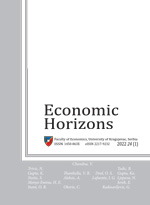EVALUATION OF THE EFFECTS OF INTERNATIONAL TAX PLANNING
Srdjan M. Djindjic
Faculty of Economics, University of Kragujevac, Kragujevac, Serbia
In this paper, the effects of the essential instruments of tax planning related to the effects of the deferral of the repatriation of international income, the effects of the reallocation of international income and the effects of the current and perspective reform tendencies in the EU member countries on the achievements of international tax planning in the Republic of Serbia are valorized. By a meaningful restructuring of its global business transactions, a transnational corporation can gain an „extra” reduction in the effective tax burden, compared to the level of the tax burden standard, overlooked within the officially established procedure of international tax planning (OECD). As long as there are differences in the corporate income tax rates among the countries, there is a realistic incentive for TNCs to locate their income in low-tax countries and their expenses in high-tax countries. The actual reform tendencies in the EU have a two-sided influence on the achievements of tax planning in the Republic of Serbia, in the form of activating non-tax instruments for an improvement of the competitiveness of the Serbian industry as well as in the form of prolonging international pressure on the budget of the Republic of Serbia.
Keywords: international taxing, international tax planning, transnational corporation, repatriation of international income, reallocation of international income
JEL Classification: H25, F23
Economic Horizons, 2014, Vol. 16, No. 3, pp. 173-189; Published online 22 December 2014; doi:10.5937/ekonhor1403177D




